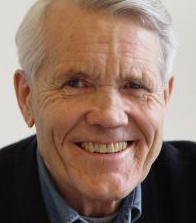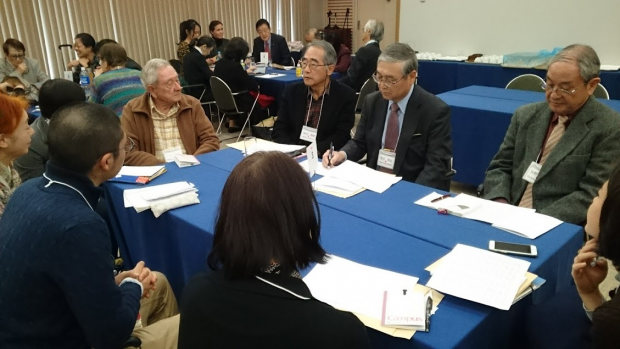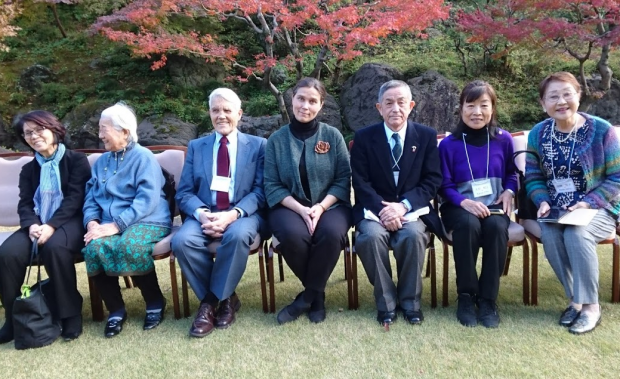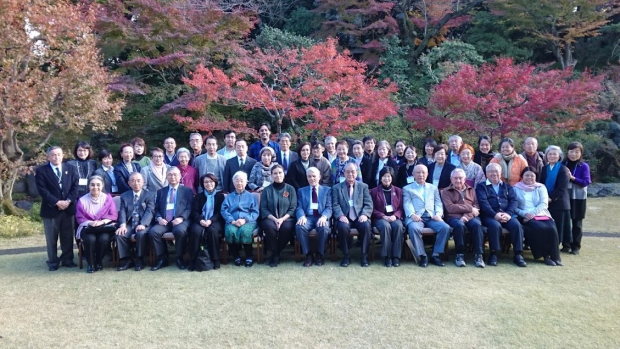Reflections on visit to Japan
It is helpful for a European to see our planet from the other side. My daughter Camilla and I were in Tokyo 16-28 November, mainly to participate in Japan’s '39th IofC International Forum'. She represented IofC’s International Council, I had received a generous invitation to come back after countless previous visits and a five year stay in the 1950’s.
In returning to Japan, I was conscious that the world’s centre of gravity had moved from the West to Asia. Now it is Asia’s turn to lead. In my opinion, the West was responsible for turning the 20th century into a catastrophe. I was keen to discover if Asia had learned from the West’s failure.
Talking to people, I noticed the impact of neighboring China’s decision to become a superpower. American soldiers on Japanese soil have guaranteed Japan’s security since World War II. Trump’s ‘America first’ and China’s growing power raises the question of whether that guarantee will be sufficient in the future. Is it now necessary for Japan to rearm? The question gives rise to sharp controversy.
It becomes even sharper when China’s President Xi Jinping makes it clear that China intends to play a central role in the world. He suggests rebuilding the ancient Silk Road running from China through the Middle East, and wants to extend it into large parts of Africa. Where colonialism left people exploited and oppressed, he says, this new Silk Road will bring education, jobs, and freedom to people who are stuck in poverty and hopelessness.
It is promising that President Xi wants to use China’s resources to serve rather than to rule. At the Tokyo Forum, Renjou and Grace Liu, along with their daughter Hsiao Yun Liu, reported on seminars they had arranged all over mainland China focusing on family life. The Liu’s seemed to think that China’s leadership is sincere in wanting to lead without establishing hegemony and structures of exploitation. I was encouraged by this observation, although my long life warns me that evil has a way of tripping up good intentions.
'My First Step Forward – If I Change, The World Would Change' was the theme of the Tokyo Forum.

Camilla gave the Forum’s keynote address. I had the impression that her down-to-earth picture of IofC’s weakness in many countries, combined with her conviction that IofC is an idea whose time has come, resonated with the audience.
I used my speaking time to illustrate the power of reconciliation. After World War II, Europeans like myself had mistrusted the Germans. When we today welcome Germany’s leading role in Europe, it is because Germany has taken courageous steps to remind their citizens of the harm their country did. The monument to over six million Jews who were exterminated occupies nearly an entire block in the heart of Berlin. The Gestapo headquarters and concentration camps all over the country have been turned into public museums.

French-German reconciliation was the starting point of the European Union (EU). I characterized the EU as the biggest peace project in human history: 27 nations which had been at war with each other continually for centuries, had begun to dismantle the borders between them and to subject their economic and political decision-making to a supra-national institution. That this experiment has experienced growing pains like bureaucratization is to be expected. That the last couple of years also have seen a revival of nationalism, and Britain deciding to leave the EU, is more disturbing. Yet I expressed confidence that the dynamism of regional cooperation and the prospect of a future without war will assert themselves.
In Japan, I was encouraged to discover that a growing number of people recognize the importance of a good relationship with Japan’s neighbours, and that they are also prepared to do something about it. The president of Japan’s IofC foundation recently visited a Chinese province with a delegation of 500 from Japan’s Shizuoka prefecture. They were struck by the warm-hearted reception they received. A member of Parliament has suggested that a joint commission of Chinese, Korean, and Japanese historians should be formed to establish a common understanding of what happened before and during World War II. The Caux Round Table, an IofC offshoot which works in tandem with IofC Japan, currently campaigns for Japanese companies to insist that their suppliers in South East Asia respect human rights and give their employees decent working conditions. A young Japanese who trained with IofC in India is now working to connect famers and urbanites in Tokyo’s farmers’ market. He wants to play his part in ending the dilemma that many in rich societies die of overeating, while many in poor societies starve to death.

'Every great achievement was a vision before it became a reality,' Henry Kissinger writes in his book about China. Frank Buchman’s vision was that Japan should become 'the lighthouse of Asia'. The function of a lighthouse is to help ships choose the right course and prevent shipwrecks. After Hiroshima and Nagasaki, Japan knows what a future shipwreck might involve. IofC in Japan is today much weaker than it was in Buchman’s days, but reconciliation is more than an IofC idea. It resonates with the hopes and longing of millions. As the world’s new centre of power, Asia has the privilege to set the pace and show the way. How IofC best can contribute to this might be a focus of upcoming global IofC consultations.
Photos by Yoshiki Nakajima
Jens J Wilhelmsen is Norwegian and fought in World War II to free his country from German occupation. After the war, he had the unique experience of spending a decade in two of the countries which lost, in Germany from 1948 to 1953, and in Japan from 1953 to 1958. In both countries he worked with IofC, and distilled his experience in two books: 'Men and Structure' (1982) and 'Eyewitness to the impossible' (2016). The first deals with the inter-action between change in social structures and human attitudes, the second reports on reconciliation and trust-building as a means of solving conflicts.
NOTE: Individuals of many cultures, nationalities, religions, and beliefs are actively involved with Initiatives of Change. These commentaries represent the views of the writer and not necessarily those of Initiatives of Change as a whole.



